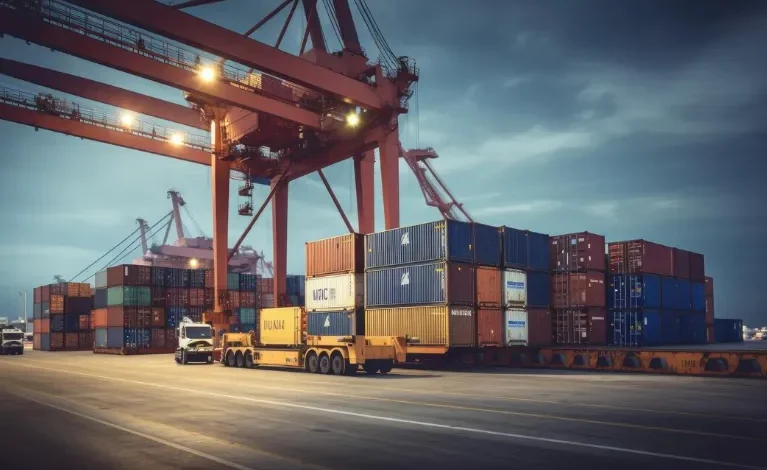Navigating the Modern Marketplace: The Pivotal Role of Logistics in Business Operations

Logistics has moved from being a supporting position to being the foundation of effective corporate operations in the fast-paced world of business, where the globe is the marketplace and speed is the money.
For supply chain managers optimizing intricate networks, small business owners aiming to compete, and e-commerce companies struggling to meet same-day delivery expectations, logistics is more than simply an operational detail—it’s a strategic need.
Contents
Why Logistics Matters to E-commerce and Supply Chain Management
Consumer expectations have been changed by the rise of digital commerce; quick shipment, real-time tracking, and simple returns are now considered the norm.
In a saturated marketplace, seamless logistics are essential since they enable a great client experience and act as crucial differentiators.
1. The Speed Factor in E-commerce Fulfillment
In a landscape where two-day delivery once dazzled but is rapidly becoming the norm, the efficiency of last-mile delivery takes center stage.
Here, technology and data analysis merge to predict customer behavior and optimize delivery routes. It’s the difference between abandoned carts and loyal customers.
2. The Symbiosis of Logistics and Supply Chain
Logistics is a critical component in the supply chain that oversees the timely and effective delivery of goods to retailers, wholesalers, and ultimately consumers. The global supply chain is fueled by:
- transparent communication
- inventory control
- strategic warehousing.
3. Balancing Inventory and Demand
The careful balance of inventory and demand forecasts is a delicate act for retail and e-commerce enterprises. Stockouts or overages directly impact the bottom line and customer satisfaction.
Sophisticated software is now the fulcrum of this balancing act, providing real-time insights and inventory control.
Key Challenges in Logistics for Small Business Owners
Logistics may be a difficult puzzle for a lot of small business owners, hindering rather than facilitating growth. Limited resources and expertise often overshadow the potential strategic benefits of a well-oiled logistics plan.
1. The Burden of In-house Operations
Small businesses may find it difficult to maintain their resources when dealing with fleet management, warehouse upkeep, and the complex web of shipping rules. Yet, despite the time, cost, and energy drain, traditional in-house operations remain the norm.
2. Overcoming Scale-Related Hurdles
Scale is often uneven for small businesses—seasonal spikes can lead to overburdened operations, while unexpected troughs may leave assets idling. A flexible logistics company and on-demand service can offer a tailored solution to manage this volatility.
It can seem impossible for the inexperienced to navigate the maze of tariffs, customs, and industry-specific rules. However, clarity and compliance can be achieved with a well-informed approach supported by professional assistance.
4. The Last Mile and Customer Expectations
The last mile is where expectations meet reality. It’s the final leg that can make or break a customer relationship. Utilizing local deliveries and optimizing for urban densities can streamline this often-inefficient segment.

The Role of Technology in Enhancing Logistics Operations
Technology is revolutionizing the logistics sector, propelling efficiency through digital breakthroughs and data-driven insights. From warehouse robots to blockchain for transparent tracking, innovation is the new logistical baseline.
1. Automating Logistics Processes
Normally done by hand, routine chores are now handled by advanced technology and software. Automation speeds up processing and lowers human error—a big plus for deliveries that need to be made on time.
2. Harnessing Data for Decision-making
The new energy source for the logistics engine is data. It drives predictive analytics, which forecast demand, optimize routes, and identify possible bottlenecks before they cause operational disruptions.
3. The Rise of Machine Learning in Forecasting
Machine learning algorithms are bringing a new level of precision to demand forecasting, learning from patterns and deviations to provide continuously refined predictions—a boon to inventory management and order fulfillment.
4. Cloud-based Solutions for Universal Access
The benefit of cloud technology is that real-time data is accessible to all stakeholders worldwide, providing the gift of universal access. This makes it easier to make decisions in real time, which makes logistics strategies more flexible and customer focused.
Sustainable Logistics Practices
The need for environmentally friendly solutions that mitigate the harmful consequences of shipping and warehousing is growing in the logistics industry. Industry insiders believe that sustainable logistics is a morally and financially sound decision.
1. Green Transportation Solutions
From electric vehicles to biodiesel, green transportation solutions are reducing carbon emissions and cutting costs in the long run. These innovations require an initial investment but can lead to substantial savings and a reputation boost for the brand.
2. Sustainable Warehousing and Packaging
Rainwater collection and solar electricity are two examples of environmentally friendly warehousing techniques that are growing more popular. When paired with environmentally friendly packaging choices, they show a dedication to an environment that appeals to customers.
3. Optimizing Route Efficiency
Route optimization enhances customer satisfaction by reducing fuel consumption and carbon emissions while guaranteeing on-time delivery, hence reducing the environmental effect of logistics operations.
4. The Circular Supply Chain Model
By putting into practice, a circular supply chain model that prioritizes recycling, remanufacturing, and reusing materials, waste in the logistics process is closed, and the company moves closer to becoming entirely sustainable.
Final Thoughts
The logistics puzzle is complex, but solvable. By analyzing challenges, leveraging technology, and adopting a sustainable demeanor, businesses can transform their supply chains and emerge as leaders in their industry.
No longer a mere cost center, Hopewell logistics is now the strategic heart of successful, customer-engaging business models. It’s time for enterprises—large and small—to recognize the pivotal importance of a well-executed logistics strategy and invest in the future of their business.



